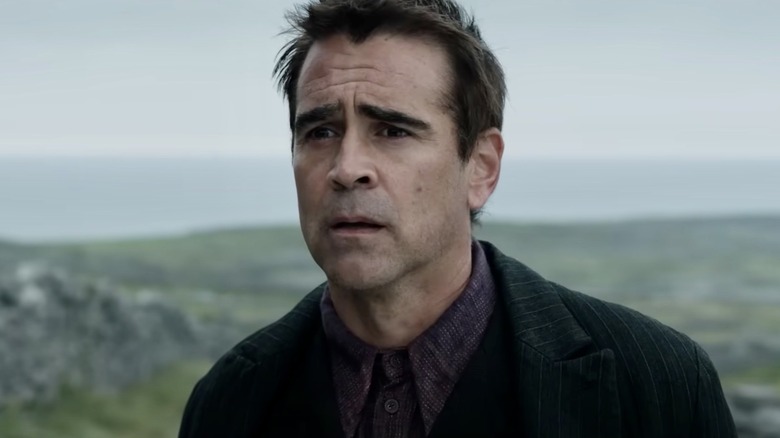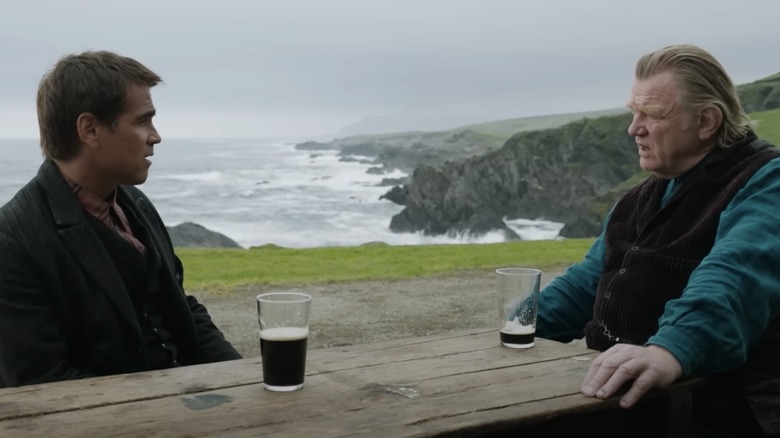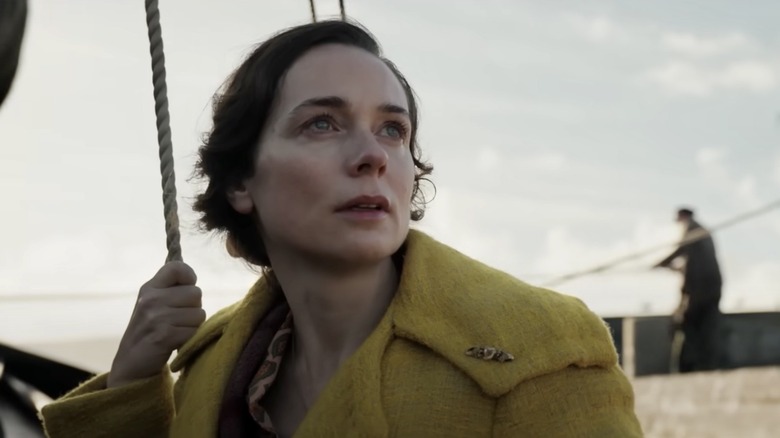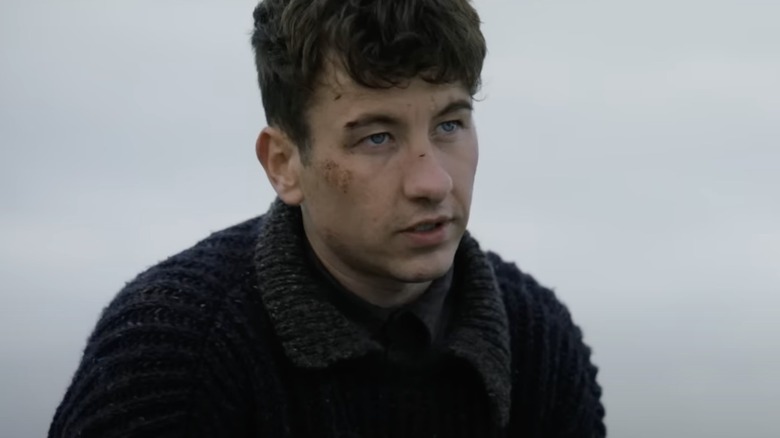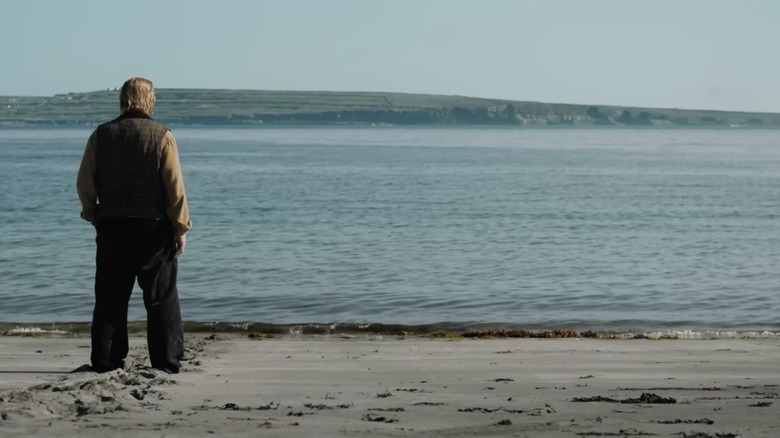The Daily Stream: In The Banshees Of Inisherin, The Heart Is A Bottomless Pit
(Welcome to The Daily Stream, an ongoing series in which the /Film team shares what they've been watching, why it's worth checking out, and where you can stream it.)
The Movie: "The Banshees of Inisherin"
Where You Can Stream It: HBO Max
The Pitch: Inisherin is an island of lonely, mismatched people, some of whom would rather be with anyone but the one person right in front of them. Pádraic (Colin Farrell) shows up at his best friend's house one day, ready for their traditional 2 p.m. pub visit, only to receive the cold shoulder from Colm (Brendan Gleeson). Soon, he's confronted with the reality that their relationship was one-sided, forcing him to question his sense of self-worth as his whole life is thrown into disarray, and his small island community with it.
In his first film since the Oscar-winning "Three Billboards Outside Ebbing, Missouri," writer-director Martin McDonagh reunites with the stars of "In Bruges" for a story that's about more than just the end of a lifelong friendship. "The Banshees of Inisherin" is a film with some layers to it, one being the historical backdrop of the Irish civil war. The breakup of the bromance between Pádraic and Colm could be seen as a miniature version of that conflict. But that's probably not why you've seen Barry Keoghan and Kerry Condon's heartbreaking "There goes that dream" scene going viral.
"The Banshees of Inisherin" brings to the surface the power imbalances that exist in most human relationships. In doing so, it augurs the depths of the human condition, which is sometimes profound loneliness, an inability to be accepted, liked, or loved as much as we need. When all our best efforts at communicating and trying to understand someone and have them reciprocate are for naught, where does that leave us?
Why it's essential viewing
"The Banshees of Inisherin" uses its regional specificity — in fecking Ireland circa 1923, almost a hundred years ago now — to tell a timeless, tragicomic tale that might speak to anyone who's ever had a relationship where you cared about someone more than they cared about you.
It could be a friendship like Pádraic and Colm, a family relationship like Pádraic and his sister Siobhán, or a would-be romantic relationship like Pádraic's new best friend, Dominic, and Siobhán (as portrayed by Keoghan and Condon). It could even be a casual relationship, such as the authority figure of a priest who withholds forgiveness of sins, a policeman who won't say hello but will flagrantly abuse his power (as a parent, too), or the shopkeeper who hasn't paid Pádraic and isn't impressed with his "news."
In sociology and psychology, there's this idea of "the principle of least interest," whereby the person who's less emotionally invested in the relationship holds the most power. Much of the time, Colm is that person in "The Banshees of Inisherin." He's decided he doesn't like Pádraic anymore and is ready to be done with him, just because Pádraic is a dullard who no longer holds any utilitarian value for him as rededicates his life to being the Mozart of fiddlers.
"But you liked me yesterday," Pádraic protests. Yet the way Colm retorts, "Oh, did I, yeah?" suggests he was never as invested in the friendship as Pádraic was. And now he'd rather cut off his own fingers than waste one more minute of his life talking to Pádraic. If they had phones, texting, or email, he could maybe dodge Pádraic's calls or sever all ties with the push of a button. As it is, he'll walk right by him and his cows on a dirt road without even acknowledging his presence.
All the lonely people
In "The Banshees of Inisherin," it's as if all love is unrequited. While confronting Colm in the pub one night, Pádraic stresses Siobhán's importance to him as proof that their lives aren't insignificant. But he's also quick to cancel his sherry date with Siobhán and walk out the door when she asks, "Do you ever get lonely?" Though Pádraic offers a nice drunk sentiment of love and loyalty, it doesn't always hold true in sober reality.
In an overhead shot, we see how Pádraic and Siobhán sleep in separate twin beds with their backs to each other and a gap in-between them (not unlike the one across the pub table or the one between the island and mainland). Colm is across town, alone in his bed, and Siobhán is across the room from Pádraic, crying herself to sleep, thinking no one in town likes her. It's like something out of the Beatles song "Eleanor Rigby." Rather than make an honest attempt at supporting Siobhán, Pádraic can only look across the unbridgeable gap and expel an unempathetic, "What's the matter?"
As Pádraic puzzles over why Colm has cut off all contact with him, he remains oblivious to Siobhán's emotional needs, and we get the sense that his relationship with Dominic is also one of convenience. Pádraic tolerates Dominic the way Colm once tolerated Pádraic. (Farrell also starred opposite Keoghan in "The Killing of a Sacred Deer," and after their appearances as the Penguin and Joker in "The Batman," it adds another little layer to them buddying up here.)
Pádraic will furthermore go out of his way to avoid talking to the film's real resident "banshee," Mrs. McCormick (Sheila Flitton), even if it means hiding behind a stone wall as she comes walking down the road at night. He literally stonewalls her the way Colm figuratively stonewalls him.
Opting out
In "The Banshees of Inisherin," the power dynamic between Pádraic and Siobhán shifts, and in the same way, the film allows the viewer to identify with both Pádraic and Colm, the latter of whom just needs space and wants something more out of life (even if he's not nice about it).
As a writer, there's a part of me that's like Colm with his music, in that I tend to prioritize it over people and even my health sometimes. Self-mutilation isn't a threat, as it is with Colm, but there are definitely times when I've gotten so wrapped up in what I was doing that I neglected the basics like stretching, eating, or even the necessary Stanley Kubrick bathroom scene. My wife has her own workaholic ways, which drive her toward a similar result — skipping lunch sometimes — for the opposite reason that she's too busy attending to others.
With a third of our lives spent working, some viewers might even see the face of a fractured business relationship in the unresponsive Colm. Pádraic could stand in for someone coming to terms with how transactional that relationship was, or how aloof their employer remains to them despite their labors. The quiet quitting phenomenon suggests many people may be as unfulfilled by their jobs as Colm is in his friendship with Pádraic.
Colm also struggles with depression. In the confession booth, where his priest asks, "How's the despair?", it's hinted that he's ready to leave this life, and quitting his friendship with Pádraic may be part of his exit strategy. For him and other characters, the specter of death – personified by the banshee, Mrs. McCormick — always hangs on the outer edges, reminding us that sooner or later, we're all going to leave this life and be forgotten on earth.
Different islands, mutual feelings
As Pádraic's self-respect gets wrapped up in rejection and he refuses to respect boundaries, "The Banshees of Inisherin" taps into the fear that, at the end of the day, we're all trapped in a tenuous place, making fools ourselves on an island where nobody cares. If we're lucky, we'll escape to new opportunities on the mainland, but there's no telling if it's any better over there with its explosions.
The themes of this film are so universal you could apply them to almost any situation. Streaming it right before the holidays hit me hard. It made me think about old friends I've lost touch with, acquaintances I've snubbed (and how that's come back on me), and newer parasocial interactions, not so much with celebrities as with online peers.
The internet can be your best friend one day, and the next day it's a place where the principal of least interest favors anyone but you. Just as Pádraic obsesses over Colm while brushing off his sister, I can't tell you how many times I've gotten hung up on someone not replying to a message while I procrastinate about ones other people have sent me. Inisherin and its residents at least have the benefit of face-to-face conversations, which forces them to be present and engage with each other when they'd rather not communicate at all.
"The Banshees of Inisherin" prompts questions like: what do you do when someone's just not that into you, or when your own heart's no longer in something? Who will be there for us when we need them, and have we made ourselves available to others the same way?
Surrounded by loneliness yet somehow ostracized, Pádraic is desperate for his friend's approval, but he only wants what he can't have. That's the fickle nature, perhaps, of all us human beings, wailing like banshees into the void.
